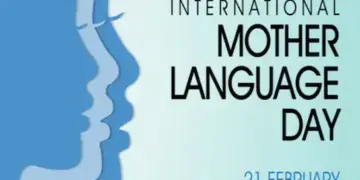BY: Arif Rashid
Mathematics, also referred to as the “queen of the sciences,” is a subject that all people require and discuss. The subject is dominant and pervasive; whether one is building a roof for a house or launching a satellite into space, whether one is studying engineering sciences, the arts, literature, history, finance, or any other field, one can find evidence of mathematics everywhere.
What is mathematics and why is it so crucial? First, let’s consider its definition. Various expositions and exemplifications have been offered by various individuals over the years. Some have referred to it as the science of numbers, while others have called it the science of figures, etc.
Richard Courant and Herbert Robbins’ definition of mathematics as “an expression of the human mind reflecting the active will, contemplative reason, and the aspiration for aesthetic perfection” is the one I find most compelling, it is not the only definition that I prefer. There are four fundamental components of it: generality, individuality, analysis and building.
The interplay of these diametrically opposed forces and the fight to bring them together is what gives mathematical science its vitality, utility, and ultimate value, despite the fact that different traditions may place differing emphasis on particular elements.
The question now is why mathematics occupies such a special position in education. What makes it appropriate to be a curriculum artefact? When the Greeks dominated the world with their wisdom, as explained in more detail below, this is why the brilliant philosopher Plato wrote on the entrance to his academy, “Let no one enter uninformed of mathematics.”
Let’s try to think about these facts for a while. My personal opinion is that mathematics is a universal language that mediates, transmits objects, figures, or physical quantities with numbers, concretizes abstraction, and, most importantly, upholds divinity. As Leopold Kronecker once said, “God created natural numbers; everything else is man’s handiwork.”
Mathematics offers a powerful method for developing mental rigour and encourages logical reasoning. It also instils rationality, logic in reasoning, and quality in decision-making. Additionally, understanding mathematics is essential to comprehending the material in other areas like physics, social studies, and even music and the arts.
The renowned Pythagoras theorem was employed by the Greeks to create the first musical composition. Transversality is a feature of mathematics. If we consider the history of education in general, geometry and algebra were two of the seven liberal arts both in ancient Greece and in mediaeval Europe. This historical function lends credence to the idea that mathematics has contributed to the development of the mental discipline needed for other courses.
Mathematical literacy, which comprises fundamental calculation abilities, mathematical reasoning, spatial reasoning, etc., is an essential characteristic of people leading more fruitful lives as responsible, active, and reflective citizens.
To substantiate my assertion, I will give examples from mathematics being used in fields and disciplines that don’t even appear to be remotely related to mathematics. I give a few examples: group theory is used in quantum mechanics, modelling and bio-mathematics are used to diagnose and treat diseases, and the Fibonacci sequence is used in poetry and music. Understanding complex numbers is a prerequisite for learning many concepts in electronics.
In contrast to the aforementioned mathematical literacy, the intricacy of problems that arise in other physical processes frequently needs quite advanced mathematical concepts and techniques. Indeed, mathematics is a component of our cultural heritage as humans, and we have a duty to preserve that heritage.
There are “n” concerns that need to be considered about in light of the current situation at our place, but I’d want to focus on the following few because they have surely deeply affected or scratched my skin.
The University of Kashmir’s mathematics department recently hosted an alumni gathering, which drew a sizable turnout from the department’s graduates.
Discussions about the subject’s current status, as well as our roles and obligations in relation to it, took place during the convention. The audience was made aware by a few presenters that only one of the cluster university’s six component colleges has provided mathematics as a major under the new education policy scheme (NEP 2020).
Everyone in attendance was appalled to learn this, which came as a severe shock. The Kashmir Mathematical Society members voiced their profound distress about the situation.
They said that despite numerous meetings with and letters to the higher authorities at the university, no attention was paid to or consideration was given to such a serious problem.
An institution is deemed to be strong if its mathematics department is strong. If some modus operandi are not sought in this cutting-edge scientific and technological age, the subject is on the point of extinction.
Another, extremely regrettable story concerning the topic is that the Institute of Mathematical Sciences, which was founded in 2013 and is currently operating a five-year integrated mathematics programme, was given 150 kanals of land, but it has subsequently been transferred to the Animal Husbandry Department.
How terrible! No other region of the earth may experience such an unnatural channelling. I feel sorry for those who have been directly or indirectly involved in such thinking and doing, to say the least about it. It is perversion and moral degradation.
Author is a Ph.D Research Scholar (Mathematics)







